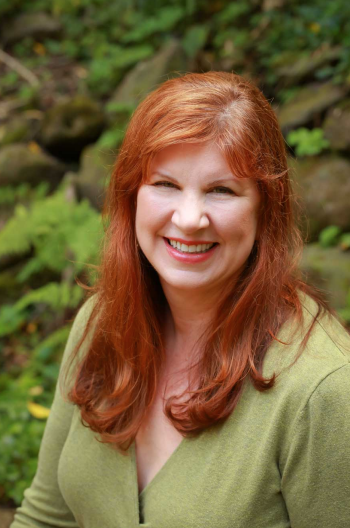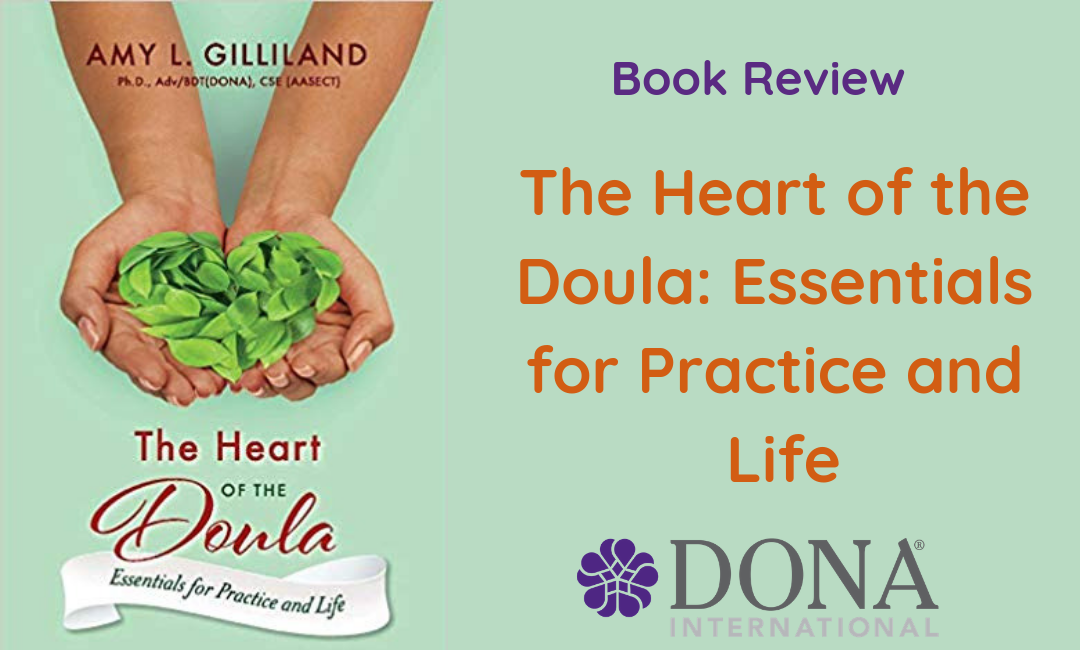Amy Gilliland, Ph.D., Adv/BDT(DONA), CSE (AASECT) believes that doulas have the potential to change the world through connection and caring for another person, and this book is one way that she seeks to help doulas do exactly that. Dr. Gilliland has conducted qualitative research with more than 60 doulas since 2002, and her new book, The Heart of the Doula: Essentials for Practice and Life, (self-published in December 2018) aims to present the collective wisdom of all the doulas she interviewed into an easy-to-read package for not only novice doulas, to make them think about some of the issues that she presents, but also to proficient and advanced doulas to add validation, subtlety, recognition, and support to their existing experiences. Dr. Gilliland also sees the book as an opportunity for nurses and other healthcare providers to better understand the complexity of doula work.
Dr. Gilliland’s #1 goal with the book was to have an avenue to distribute these insights that she had gleaned from her years of research and critical analysis of the doula profession, hot button issues for doulas, and current best practices. Dr. Gilliland started to publish her blog “Doulaing the Doula” in 2013 to begin distributing some of this information, but the book is the culmination of many of the emerging themes she found in her research. What is most clear upon reading the book, is that Dr. Gilliland has spent a huge amount of time thinking about, researching, and trying to best understand doulas.
About the Book
This book is a quick read and the language used is accessible and not too academic. The chapters read more like essays and are divided into five main topics of discussion: foundations, scope of practice, clients, medical professionals, and powerful prenatal relationships. The chapters present the information in a clear and concise way, and each certainly invites reflection on doula practice and philosophy in a way that all doulas will find intriguing and perhaps helpful. Many chapters will leave readers feeling like they had a conversation with an experienced trainer who is extremely confident and unafraid to lay out the very real, pragmatic, and specifically detailed side of being a doula. Dr. Gilliland does not mince words when it comes to telling doulas what we should or should not be doing, especially when it comes to our interactions with clients and medical professionals. She invites doulas to contemplate some issues, and whether you agree with her or not, she certainly provokes reflection, and that is all the more reason that this collection of knowledge is fascinating.
More from the Author
 I got the chance to speak with Dr. Gilliland by phone for this review and had a fascinating conversation about not only the book but her entire perspective on the work of doulas. Dr. Gilliland said that she is not trying to be prescriptive, rather that this is what she has to offer doulas out of her research. Dr. Gilliland believes that all doulas should focus on showing up and being there for their clients, being totally present and available during the labor and birth, in full support of the client’s preferences. Unbiased support is the biggest gift a doula can give their clients. She was also extremely surprised to find out, from her research just how few obstetricians find real value in doula support. Dr. Gilliland believes that when more obstetricians shift to a shared decision-making model of care more people will have more satisfying birth experiences. Dr. Gilliland stated that she sincerely wonders why there are not more randomized control trials on doula support. I certainly agree that more quantitative research would be really helpful for doulas, and would be especially complimentary to this type of qualitative long-term research that Dr. Gilliland has performed and presented here.
I got the chance to speak with Dr. Gilliland by phone for this review and had a fascinating conversation about not only the book but her entire perspective on the work of doulas. Dr. Gilliland said that she is not trying to be prescriptive, rather that this is what she has to offer doulas out of her research. Dr. Gilliland believes that all doulas should focus on showing up and being there for their clients, being totally present and available during the labor and birth, in full support of the client’s preferences. Unbiased support is the biggest gift a doula can give their clients. She was also extremely surprised to find out, from her research just how few obstetricians find real value in doula support. Dr. Gilliland believes that when more obstetricians shift to a shared decision-making model of care more people will have more satisfying birth experiences. Dr. Gilliland stated that she sincerely wonders why there are not more randomized control trials on doula support. I certainly agree that more quantitative research would be really helpful for doulas, and would be especially complimentary to this type of qualitative long-term research that Dr. Gilliland has performed and presented here.
The reviewer’s thoughts
I was a bit perplexed about the choice of Dr. Gilliland to present almost the entire book in one unified voice that reads as if it comes straight from her head rather than from years of research interviews with many doulas. As someone academically trained in qualitative research myself, my expectation was that Dr. Gilliland would bring the voices of her participants to the forefront and be very clear about the sources of her ideas, but her goal of communicating the findings of her research and her processes for doula work for all doulas to read seems to be the more pressing matter she is attending to here. When I pursued this line of questioning with Dr. Gilliland, she explained that this interpretive choice helped make the book easier to read and more accessible to the average person. This stylistic choice, as noted before, made the book read more like a collection of professional essays rather than a unified presentation of a massive amount of qualitative data, and I would have liked to have had the research participant voices be front and center, rather than as a singular voice. The author shared that she intentionally did this for ease of reading, but this stylistic choice focuses Dr. Gilliland’s voice over study participants. She does have a few quotes from noted doulas within the book, but far less than I anticipated. Similarly, the tone of the book sometimes comes off as an authoritative statement telling you exactly what you should do as a doula, and I think that is influenced by this style of research presentation. Several chapters do have works cited either as footnotes or at the end of the chapter, though many of the works are academic articles behind paywalls (a hotly debated issue in academia currently), and most of the book’s content comes directly from Dr. Gilliland’s research.
In Conclusion
Dr. Gilliland has incorporated a vast amount of data and ideas, along with her extensive experience as a doula and doula trainer, into a concise, easy-to-read format that invites reflection on what it is to be a doula and what she believes doula best practices should be. Her years of research coalesce into this book that invokes consideration on both the practical and philosophical approaches to doula work. This book does not read like an academic book, but more like a conversation about many aspects of doula work and life. This book will be an enjoyable read for all doulas, regardless of experience or practice style.
Dr. Gilliland continues to work on researching doulas as a fellow at the University of Wisconsin-Madison’s School of Human Ecology, where she has started looking at the brain structures of experienced doulas among other projects. She is also a birth doula trainer for DONA International. You can learn more about Amy Gilliland and purchase the book at Dr. Gilliland’s website.
About Hillary Melchiors
 Hillary Melchiors, Ph.D., MPH, LCCE, CD(DONA) holds a Ph.D. in Medical Anthropology and a Masters in Public Health from Case Western Reserve University. Since 2014, she has worked as a DONA birth doula and Lamaze childbirth educator in Evansville, Indiana and is the owner of the Doula Group of Evansville.
Hillary Melchiors, Ph.D., MPH, LCCE, CD(DONA) holds a Ph.D. in Medical Anthropology and a Masters in Public Health from Case Western Reserve University. Since 2014, she has worked as a DONA birth doula and Lamaze childbirth educator in Evansville, Indiana and is the owner of the Doula Group of Evansville.



I totally want Dr G to check out my brain structure! That sounds fascinating. As a doula with 27 years of experience, I feel like my brain has made big changes over the years. I do wonder what she will find with her work!